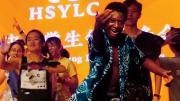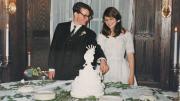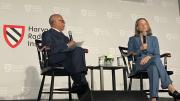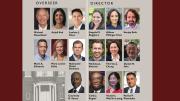We flew into Hangzhou with swampy armpits and jet-lagged eyes. Each of us had our own classroom dreamscapes, with syllabus titles like “(Post)human Creativity: Art in the Digital Age” and “Dances With Wolves: Animal Psychology and Human Body Language.” The conceit of the Harvard Seminars for Young Leaders in China (HSYLC) is that the spirit of American liberal-arts education can open up the minds of Chinese teens, long beaten stiff by a soul-sucking education system. (Later, when I asked my kids about Chinese high school, they told me that it is perversely exam-focused, not particularly interested in students’ personal thoughts, and harshly competitive. When they asked me about Harvard, I said that it is perversely exam-focused, somewhat interested in students’ personal thoughts, and harshly competitive.) We could teach anything we wanted. I was determined to teach my four classes, of 15 students each, at Hangzhou No. 2 High School, how to rap.
My class, “Africa, America; Hip-Hop, Poetry,” would be about black words from home and from here. “Home” is Botswana, but it would have been sinful to not teach Song of Lawino, the Ugandan epic poem whose narrator fights to prove to her husband that their culture is just as meaningful as that of their colonial oppressors. “Here” is America, which the kids knew principally through pop culture, the Internet, and their own Harvard aspirations. What they didn’t know is that it is also home to a deep and historic black struggle and the rugged art born from it. Going on a fast-forward ride through old school hip-hop to the current day, from Eric B. and Rakim to Nas to Kanye West to Kendrick Lamar, the class would consider the political and cultural lessons of these artists, and compare them to my students’ experiences growing up in China.
One would assume, or rather one would hope, that the person teaching this seminar would be entirely at home in the fact of his skin. I am not. I find the fact of it bemusing. I have trouble reconciling the way the world is definitionally absolute in what my blackness must mean, with the colorlessness of my writing. Having denied myself my native language, Setswana, by stubbornly gliding through the Western canon as a teenager, I now cannot use the tones and textures of my forefathers’ speech. Having being denied, by virtue of being a foreigner, the same black experience as African Americans, I also cannot quite access the power of their own twists and turns of the English language. I marvel at the Pan-African poetry of some of my freedom-fighter-aspiring friends back home, thick with metaphors and sounds that I cannot find within my heart to try. My own attempts at it are clumsy approximations of experiences that I am barely in touch with, despite having lived in the same continent in which Chinua Achebe wrote Things Fall Apart.
Meanwhile, in America, the soul and harshness of its rappers move me with tales of their own black lives and their questioning of the white political structures that dehumanize them. Kendrick Lamar, in the unofficial but de facto theme song of the Black Lives Matter movement, “Alright,” shouts out “and we hate po-po, wanna kill us dead in the street fo sho.” While teaching this song, I thought of my mother’s warnings to watch out for the American police as I prepared to come here for college. The campus police don’t bother me because I am a Harvard student, so I’d never worried much about what she said. After all, the interests of the campus police lie primarily in the safety of its students. A lot of black Americans, and thus a lot of black rappers, do not feel that their interests align with those of the police. “I personally haven’t experienced the kind of life that a lot of the rappers we will be studying have had to live through,” I explained to my students last summer, “so I’m trying to be careful when talking about their struggles. I want us to respect their stories, especially because we haven’t lived the same lives they have.”
Then, one cold afternoon this fall after the China trip, the Harvard Advocate building was suddenly raided by a group of campus police officers—guns pointed toward our three bodies, mine and two other students’—who told us to put our hands up in the air and our faces against the wall. The back door was broken. A back window opened clean and full. The building a drunken post-party mess. They worried that maybe there’d been a robbery. Of the three of us, only I was black, and one of the police officers was black, so surely it had nothing to do with my skin? If I were sure that it did, then maybe my own rapping would be as angry, as righteous, as honest as Kendrick’s...wouldn’t it? Our words would be the same and we would be the same. In the same song, Kendrick chants, “we gon’ be alright, we gon’ be alright” and I go wild at every party that I hear it at because I am alive, I am all right, and he and I are still not the same; so it is easier for me to believe that we, and all black people, will be alright. And now I cannot help but wonder.
While teaching it, I considered my class more of a creative-writing seminar than a class about politics, and so I assigned poetry and rap-composition homework instead of essays. I was curious to see where this would take my kids. Given that they were Chinese and neither African nor African American, could they avoid the tension I felt, working as a colourless artist in a medium of black art? Would they be able to bypass all this and just...write? I would remind them before the end of class, snapping my fingers, “One. Two. Three. Four. One. Two. Three. Four. Never forget the rhythm when you’re rapping and writing down your lyrics. Always keep to the beat.”
This is good advice for any rapper. It is also advice that I rarely follow. With my own rapping, I feel as if I’m simply mouthing abstract whispers that occasionally match a beat. It is difficult for me to follow the rhythm. All the longs and shorts confuse me and my mouth gets filled with things I can’t understand, cannot taste properly. My sense of rhythm feels so separate from the flow of my words that composing just four lines of rap can take more than an hour. I fumble. I scratch out failed verses in heavy black ink. I lisp. And I do not know how to engage the colorlessness of my black experience with the crisp, dark textures of the great African poets and American rappers. Yet I still tried to rap and I still tried to teach rap. It was the closest I felt I was going to get to understanding the puzzle of my blackness. I loved my students, their confusions and their enthusiasms. The lessons continued, and so did the teaching.
The final exam was an in-class performance of a piece of each student’s own creation. One shy girl who barely said a word during class suddenly rapped aggressively to a very bass-heavy trap beat. One boy who had been the only one tapping his feet to the music I played performed a set of verses that might as well get a professional release. Some of the kids stumbled over their rhythm; some decided not to bother with following a rhythm at all. I was indiscriminately amazed by each of them, regardless of the quality of their writing. A bunch of Chinese students with absolutely no rap experience, with second-language English ability, absolutely killed it. In return, I showed them a little bit of my own rapping. Depending on the individual class group, I did either a long-form freestyle—letting the words rush out of the top of my head, never really knowing where the syllables would take me, but going on nevertheless—or I performed some pre-written songs with beats produced by a friend, another Harvard student. Normally my favorite to perform is “Poet, Prophet,” a nerdy little romp through metaphysics and literary spiritualism:
Listen to the glimmers of the solar system
Simmering murmurings stretching ’cross the universe, this is my vision
As a poet as a prophet with the lyrics, man I copped it
Caught a wave, detected it, and to this beat I drop it
During the very last class, though, I opted for “Trippin’,” the closest I’ve gotten so far to an explicit expression of my blackness. Typically, right before the big beat drop I punch a black power first in the air and roar, “YOUNG BLACK BROTHER FROM THE MOTHERLAND.” I feel as if I perform another self when I rap, especially when I perform “Trippin.’” This rap persona is meant to be unabashed in the joy and experience of his skin, intimate with the longs and shorts of the beats, and able to jump across the stage in wild freedom, entirely himself. But I am not much of a performer. I am always reminded—through a slither of light or camera flash from the top of a balcony, a lyric that doesn’t quite fit comfortably in my mouth, young black brother from the motherland—that I am playing at something that I don’t understand. Still, after each performance my students clapped for me, impressed by my play at black brazenness.
After the program ended, the Harvard Seminar leaders and the Chinese teaching fellows who’d helped us went on a little field trip through Hangzhou. We went to the famous market in Hefang Street and happened upon some of our students. We walked around, bought green-tea ice creams and other treats. Then we heard a steady thump of large men pounding rice into mochi, heaving a huge wooden pestle back and forth between them while singing with deep voices. One. Two. Three. Four. One. Two. Three. Four. One of the other seminar leaders started beat-boxing while we continued walking, and I joined him with my rapping. My students began to record a video and we drew a small crowd. We kept walking and rapping, dancing, splaying black words all over this place far from where they were born. A few days later, I watched that video again and again as Hangzhou grew smaller by each second through the airplane window. I was confused by my pixellated self, sailing through Hangzhou’s streets with a cool, lyrical breeziness. It didn’t feel like me—no, not exactly.
The description for my class read, “Words define who we are. The better we are able to use them, the better we are able to understand ourselves, each other, and even the world around us.” By the end, I was deeply impressed by my kids’ work. But I remained as confused about black words as ever, and now that I am back at Harvard, my thoughts about this aren’t much clearer. I have temporarily suspended actual lyric-writing in a small effort to get my academic life together, though I still skip from one part of the Yard to another, muttering freestyles to myself, between classes. If not too many people are around, the words become audible and I jump a little and wave my hands between the beats. I still do not have the rhythm perfectly together. I am still out of step. I am still confused about my skin. I still speak these black words.









